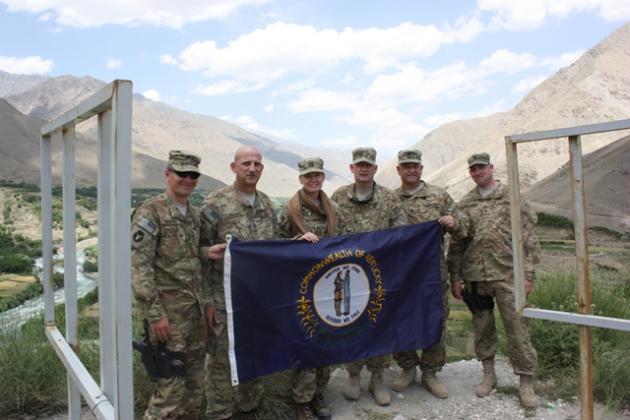Bees and Mulberries: A local soldier becomes part of a US/Afghanistan agriculture project
For the majority of us, what we know about the Middle East comes from the evening news or headlines that pop up on the internet. For Kentucky National Guard Major Lawrence (Allen) Joiner, the knowledge comes first hand. Major Joiner, a 24-year veteran, spent the twelve months of 2005 in Iraq, and the ten months from April, 2011 through February, 2012 in Afghanistan. Although they were both military deployments, there was a striking difference between the two tours.
In April of last year, Major Joiner became part of a 58-member team, made up of mostly Army and National Guard volunteers, who traveled to Afghanistan as part of a Kentucky Agribusiness Development Team (ADT). This particular team was the third (ADT3) of five teams from Kentucky slated to travel to the Middle East region.
The ADT project is an on-going commitment by the US to improve agricultural production and management in the area. Because the team is made up of members of the military, they can provide their own security and are not as restricted in their movement around the country as the non-governmental agencies in the region.

ADT3, the team to which Major Joiner was attached, operated in three different Afghan provinces: Parwan, Panjshir, and Kapisa. Joiner says the emphasis of the teams is to work in collaboration with locals in order to find “Afghan solutions to Afghan problems.” The members achieve this by working with Afghan officials, called DAILs (Director of Agriculture, Irrigation and Livestock). The DAIL is comparable to the US’s County Extension Agent. The team members mentor the Afghan DAILs in management, budgeting and marketing.
“The Afghans are excellent farmers,” Joiner says, “But they don’t understand the value chain—getting produce to market.”
One of the most successful projects that ADT3 implemented involved the mulberry harvest. Mulberry trees are plentiful in the Panjshir area, but because of the perishability of the fruit (a four-to-five week window) and the lack of a viable market, at least 50 percent of the crop is lost each season. The team located a fruit processing plant in nearby Kabul, and negotiated an agreement wherein US aid would pay for the cost of transportation of the product to the plant for the first year. Buyers from the plant traveled to the Panjshir Provence and bought the mulberries directly from the farmers, paying them on the spot for their produce.
Women’s empowerment was another important project for ADT3. Seven of the fifty-eight making up the team were female National Guard members, whose focus was to train women in bee keeping and raising poultry in order to increase family income. The Afghan women go through a week-long class (transportation to and from class is financed by an annual budget overseen by the DAIL) and upon completion, each receives one rooster and eleven hens. Bees are indigenous to the area, and after the hive boxes (supers) are constructed, they have to be placed in the family’s yard or on top of the house to prevent theft.
Morgantown resident, Bobby McKee, a long-time bee keeper himself, was recruited to do the preliminary training of the team before they traveled to Afghanistan. (McKee works with the KY Department of Fish and Wildlife Resources as a Hunter Education Coordinator for western Kentucky, and has had an interest in beekeeping since his high school years.)

The ADT plan places a great deal of emphasis on the importance of involving the Afghans themselves in the cost and construction of any structure used in the agribusiness project. Afghan contractors are used in the building of green houses, which are mainly constructed adjacent to universities, because of the institutions’ emphasis on research and development. Solar drying racks for fruits and vegetables, however, can be constructed for individual use. “The men are taught to build them, and the women are taught to use them,” Joiner says.
When the team was ready to leave for home in February, Major Joiner felt good about what they had accomplished. “It’s an on-going project,” he said (Kentucky is committed to two more teams before the project comes to a close in 2013), “But If you can understand their culture, you can make progress.”
Story by Cheryl Hughes, Beech Tree News
- Log in to post comments




























Comments